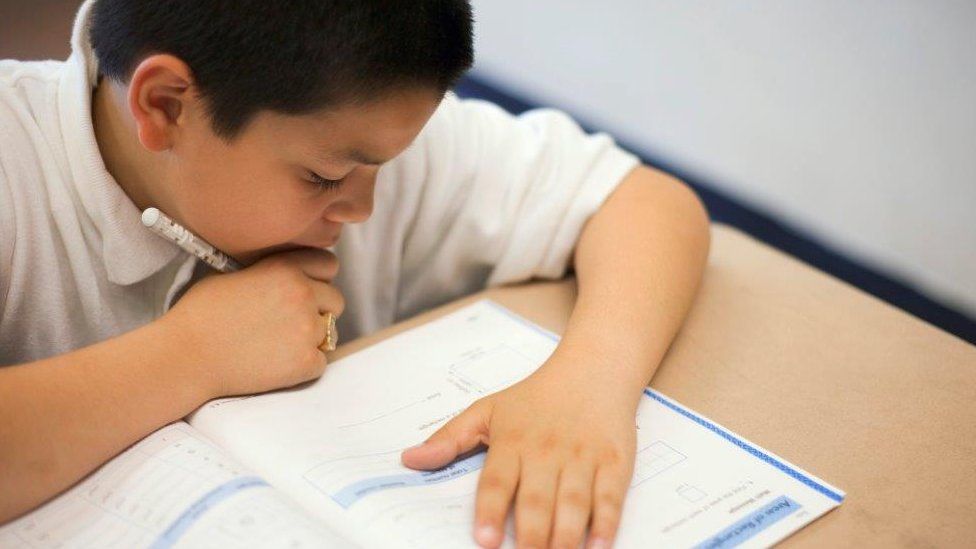Reform 'high stakes' primary tests, MPs urge
- Published

Children's education in England is being skewed by the use of high-stakes tests taken by 11-year-olds as a school league table measure, say MPs.
Annual test results should be replaced in the tables by a three-year rolling average to "lower the stakes", says the Commons Education Select Committee.
The current system has led to a narrow curriculum and "unnecessary stress" on pupils and teachers, argues the report.
Last year, new tougher tests for 11-year-olds saw passes drop sharply.
Ministers maintain that parents have a right to expect testing in schools to show whether their children are gaining the right skills in maths and literacy.
But the committee says the close link between the tests at 11 and school accountability can "lead to a narrowing of the curriculum and 'teaching to the test', as well as affecting teacher and pupil well-being".
It wants the current system scrapped, with three-year rolling averages for schools published instead of the results of individual year groups.
'Held to account'
The report also calls for greater emphasis in Ofsted inspections on a broad and balanced curriculum.
Committee chairman Neil Carmichael said too much emphasis on test results had led to too much "focus on English and maths at the expense of other subjects like science, humanities and the arts".
"It is right that schools are held to account for their performance but the government should act to lower the stakes and help teachers to deliver a broad, balanced and fulfilling curriculum for primary school children."
The report says poor implementation of the new system last year, with "guidance delayed and test papers leaked online", caused significant disruption in schools.
The MPs want ministers to reconsider the new writing assessment which emphasises "technical aspects like grammar and spelling, over creativity and composition".
"The balance of evidence we received did not support the proposition that focusing on specific grammatical techniques improved the overall quality of writing."
They also want spelling, punctuation and grammar tests for 11-year-olds to become non-statutory.
Ministers recently announced proposals to scrap tests for seven-year-olds, following years of pressure from teachers, parents and educationalists.
The Department for Education is consulting on a new assessment for pupils when they first start school - but the report urges caution when introducing a "baseline" measure.
"It should be designed as a diagnostic tool to help teachers identify pupils' needs and must avoid shifting negative consequences of high-stakes accountability to early years," they warn.
A Department for Education spokeswoman said the government would consider the report carefully and respond in due course.
Ofsted Chief Inspector Amanda Spielman said inspectors already looked for a broad curriculum in every primary school, adding that she had recently announced new research into "how the accountability system, including Ofsted, can encourage the development of a rich curriculum".
Russell Hobby, National Association of Head Teachers General Secretary, called last year's tests "a mess of chaos and confusion".
"Add into this the high-stakes nature of the system for school leaders, and you get a toxic mix."
Mr Hobby said the union had contributed to the government's proposals "to begin creating a primary assessment system that works".
"This report helpfully sets the agenda for the next stage of this debate," he added.
- Published30 March 2017
- Published30 March 2017
- Published15 December 2016
- Published5 July 2016